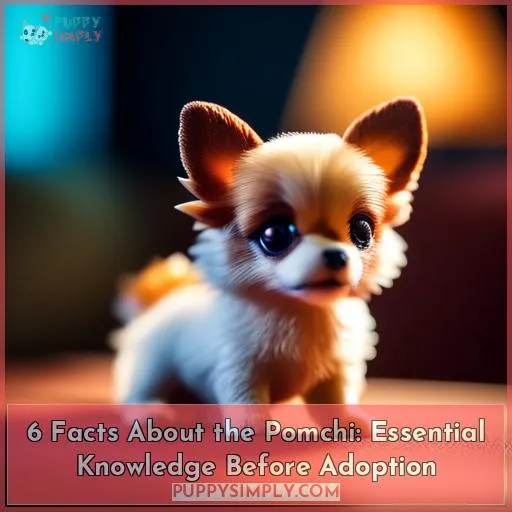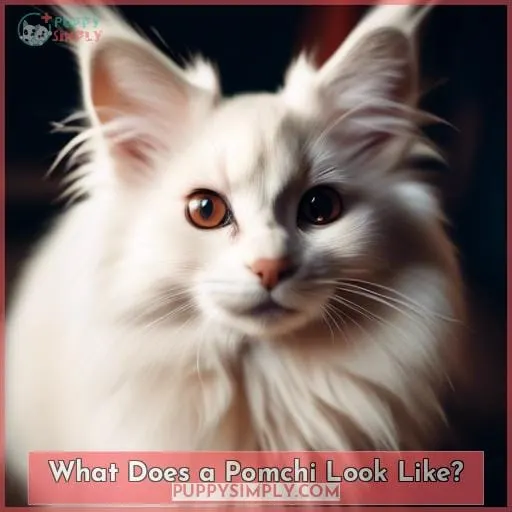This site is supported by our readers. We may earn a commission, at no cost to you, if you purchase through links.

These spirited little creatures, a delightful blend of Pomeranian and Chihuahua, possess unique traits and quirks that require understanding and attention.
Before embarking on this journey of companionship, let’s delve into six essential facts about the pomchi, ensuring that both you and your potential furry friend are well-prepared for the adventure ahead:
- These spirited little creatures, a delightful blend of Pomeranian and Chihuahua, possess unique traits and quirks that require understanding and attention.
- Before embarking on this journey of companionship, let’s delve into six essential facts about the pomchi, ensuring that both you and your potential furry friend are well-prepared for the adventure ahead.
Table Of Contents
- Key Takeaways
- How Big is a Pomchi?
- What Does a Pomchi Look Like?
- Pomchis Can Be Jealous
- Pomchis Can Suffer From Anxiety
- Pomchis Have a Short Attention Span
- Pomchis Are a Good Fit for Apartments
- Pomchis Are Easy to Groom
- Pomchis Are Prone to Dental Disease
- Pomchis Are Frequent Barkers
- Frequently Asked Questions (FAQs)
- Conclusion
Key Takeaways
]
How Big is a Pomchi?
When fully grown, you’ll find a Pomchi standing between 6 and 9 inches tall, weighing less than a gallon of milk. This makes them an ideal choice for those living in apartments or smaller homes.
Their compact size doesn’t mean they’re low-maintenance, though. These active little dogs need daily exercise and mental stimulation to stay happy and healthy.
While they’re generally healthy, Pomchis can be prone to certain health problems, such as dental disease and eye problems. Regular vet checkups and good dental care can help keep your Pomchi healthy and happy for years to come.
The lifespan of a Pomchi is typically between 12 to 15 years. With proper care and attention, your Pomchi can be a loving and loyal companion for many years.
Their small size and playful nature make them great companions for children and adults alike. They’re also relatively easy to train, making them a good choice for first-time dog owners.
If you’re looking for a small, active, and loving dog, a Pomchi may be the perfect breed for you.
What Does a Pomchi Look Like?
How does a Pomchi’s appearance differ from that of its parent breeds?
Strikingly adorable, Pomchis inherit a unique blend of features from their Chihuahua and Pomeranian parents.
Their compact bodies stand between 6 and 9 inches tall, weighing less than a gallon of milk.
While some sport a long and fluffy coat, others have a short and thin coat, giving them a teddy bear-like charm.
Coat:
A Pomchi’s coat can vary from long and fluffy to short and thin, making them versatile companions for various climates.
Colors:
Their coats come in a kaleidoscope of colors, from cream to black and everything in between. Some Pomchis even boast a captivating combination of hues, making them true eye-catchers.
Grooming:
Pomchis with long coats require regular brushing to maintain their luscious locks, while short-coated Pomchis need less frequent grooming.
Shedding:
Pomchis are moderate shedders, so be prepared to find a few stray hairs around your home.
Black Skin Disease:
Take note that Pomchis can be prone to Black Skin Disease, a condition that affects the skin and coat, leading to hair loss and discoloration. Regular grooming and a healthy diet can help prevent this condition.
Pomchis Can Be Jealous
- They’ll Get Jealous if You Give Attention to Others
Pomchis, like many other dogs, can experience jealousy.
This behavior often manifests when they perceive that their owners are paying attention to someone or something else.
This jealousy can range from mild, such as staring intently at the object of your affection, to more severe reactions like barking, growling, or even nipping.
Jealousy in Pomchis can stem from several factors, including territorial behavior, attention-seeking, and sibling rivalry.
Territorial behavior is common in dogs, and Pomchis may view their owners and their space as their territory.
When they feel that their territory is being encroached upon, they may display jealous behavior.
Pomchis are also known for being attention-seekers, and they may become jealous if they feel that they aren’t getting enough attention from their owners.
Sibling rivalry can also be a cause of jealousy in Pomchis, especially if they live in a multi-pet household.
If a Pomchi feels that another pet is getting more attention or affection from their owners, they may become jealous and act out.
To manage jealousy in Pomchis, it’s essential to understand the underlying cause of the behavior.
Once you know the cause, you can take steps to address it.
Jealousy management techniques may include providing your Pomchi with plenty of attention and affection, establishing boundaries and rules, and providing them with socialization opportunities.
Pomchis Can Suffer From Anxiety
Pomchis can experience anxiety if left alone for extended periods.
Their strong attachment to their owners can lead to separation anxiety, resulting in destructive behavior, excessive barking, and house soiling.
Imagine coming home to find your beloved Pomchi has torn apart the couch cushions in distress.
Picture the anxious yelps and howls echoing through your apartment as you’re running late for work.
Envision the frustration of constantly cleaning up accidents because your Pomchi couldn’t hold it any longer.
There are training techniques and socialization methods to help alleviate your Pomchi’s anxiety.
Patience, positive reinforcement, and crate training can work wonders in calming your furry friend.
Exposing your Pomchi to various people, animals, and environments from an early age can help them become more comfortable in different situations.
Calming aids like pheromone diffusers, calming chews, and anti-anxiety medication can also provide relief.
By understanding and addressing your Pomchi’s anxiety, you can create a harmonious and stress-free home for both of you.
Pomchis Have a Short Attention Span
The Pomchi’s short attention span means you’ll need to keep training sessions brief and engaging. This lively breed thrives on mental stimulation, so incorporate interactive games and activities to keep their focus.
Consider using a clicker or hand signals to reinforce good behavior, as verbal cues alone may not suffice.
Attention Span Improvement Techniques:
- Vary training sessions
- Use interactive toys
- Incorporate hand signals
- Keep training sessions short
- Reward good behavior immediately
Boredom Busters for Small Dogs:
- Hide-and-seek with treats
- Play fetch with a ball
- Tug-of-war
- Snuffle mats
- Food puzzles
Mental Stimulation Games:
- Puzzle toys
- Agility courses
- Interactive feeders
- Scent games
- Brain-training apps
Advanced training methods can also help channel your Pomchi’s energy and improve their focus. Consider enrolling in agility classes or teaching them tricks like rolling over, shaking hands, or playing dead.
These activities not only strengthen your bond but also provide mental stimulation and entertainment.
Despite their short attention span, Pomchis are eager to please and highly trainable. With patience, consistency, and a variety of engaging activities, you can help your Pomchi learn and thrive.
Pomchis Are a Good Fit for Apartments
Despite their short attention span, Pomchis can thrive in apartments due to their compact size and low exercise needs.
Their petite frames make them well-suited for smaller living spaces, and they don’t require extensive outdoor exercise like larger breeds.
Here are three reasons why Pomchis are ideal for apartment living:
- Space Savers: Pomchis take up minimal space, allowing you to enjoy the companionship of a furry friend without feeling cramped. They can easily maneuver through tight corners and small rooms, making them perfect for apartments with limited square footage.
- Low Maintenance Exercise Needs: Pomchis don’t require hours of daily exercise like some other breeds. A brisk walk around the block or a lively game of fetch indoors will suffice to keep them happy and healthy. This makes them ideal for busy individuals or those living in apartments with limited access to outdoor areas.
- Adaptable and Social: Pomchis are highly adaptable and can adjust to different living environments, including apartments. They’re social creatures who love interacting with their owners and can easily adapt to the routine of apartment living. With proper socialization, they can learn to coexist peacefully with neighbors and other pets in close quarters.
Pomchis Are Easy to Groom
Regular grooming maintains your Pomchi’s coat and skin health.
This double-coated breed comes in two varieties: long-haired and short-haired.
Both shed minimally, making them a great choice for those with allergies.
However, their thick coats require regular brushing to prevent mats and tangles.
Neglecting their grooming needs can lead to skin conditions, discomfort, and even health issues.
Brushing your Pomchi’s teeth regularly is also crucial to prevent bad teeth, a common problem in this breed.
With proper care and attention, your Pomchi will be a healthy and happy companion.
Despite their occasional stubbornness, they’re intelligent and eager to please, making them relatively easy to train.
Start training early, using positive reinforcement techniques, and you’ll have a well-behaved Pomchi in no time.
Just remember, these little dogs can be prone to eye problems and joint issues, so regular vet checkups are essential.
With proper care, your Pomchi can live a long and healthy life, filling your home with love and laughter.
Pomchis Are Prone to Dental Disease
Once you bring a Pomchi home, don’t forget to regularly brush their teeth to prevent dental disease.
This toy dog breed is prone to gum disease and plaque buildup, which can lead to painful infections and even tooth loss.
Daily brushing with a soft-bristled toothbrush and canine toothpaste will help remove plaque and tartar, keeping your Pomchi’s mouth healthy and fresh.
Regular veterinarian checkups are also essential for maintaining your Pomchi’s dental health.
Your vet can perform a thorough dental exam, clean your dog’s teeth professionally, and recommend any necessary treatments.
If your Pomchi shows signs of dental disease, such as bad breath, bleeding gums, or difficulty eating, schedule an appointment with your vet right away.
Dental disease is a common problem in toy dog breeds, but it’s easily preventable with proper dental care.
By brushing your Pomchi’s teeth regularly and taking them for regular veterinary checkups, you can help keep their teeth and gums healthy for years to come.
Pomchis Are Frequent Barkers
Pomchis: A Vocal Toy Dog with a Big Personality
Now that you know about their dental health, let’s discuss another common trait of Pomchis: their tendency to bark. It’s no secret that these little dogs are known for their frequent vocalizations.
- Protective Instincts: Pomchis are fiercely loyal and protective of their loved ones. They’ll bark to alert you to anything they perceive as a threat, whether it’s a stranger approaching your home or a squirrel scampering across the yard.
- Excitement and Boredom: Pomchis are also very active and playful dogs. When they’re feeling excited or bored, they may bark to get your attention or to release pent-up energy.
- Separation Anxiety: Pomchis are prone to separation anxiety, which can lead to excessive barking when they’re left alone. This is because they’re such social creatures and crave companionship.
Reducing Unnecessary Barking
While some barking is normal, excessive barking can be a nuisance to you, your neighbors, and even your dog.
- Socialize Your Pomchi Early: Expose your Pomchi to different people, animals, and situations from an early age. This will help them learn what’s normal and what’s not, and it will make them less likely to bark at everything.
- Provide Plenty of Exercise and Mental Stimulation: A tired dog is a quiet dog. Make sure your Pomchi gets plenty of exercise and mental stimulation each day. This will help them stay calm and focused, and it will reduce their need to bark.
- Train Your Pomchi to Bark on Command: Teach your Pomchi to bark on command. This will give them a way to communicate with you without barking excessively.
If you’re struggling to control your Pomchi’s barking, talk to your veterinarian or a professional dog trainer.
Frequently Asked Questions (FAQs)
Are Pomchis good with children?
Pomchis, with their small stature and playful nature, can make wonderful companions for families with children.
However, early socialization and training are crucial to ensure a harmonious relationship between your Pomchi and the little ones.
Can Pomchis live with other pets?
Pomchis, like tiny diplomats, can navigate the delicate social landscape of multi-pet households,
charming their way into the hearts of both furry and scaled companions.
Are Pomchis easy to train?
Pomchis’ intelligence and eagerness to please make them quick learners.
With patience and positive reinforcement, you’ll have a well-behaved companion who’s the envy of the dog park.
How much exercise do Pomchis need?
Pomchis, those bundles of boundless energy, thrive on brisk walks and lively games.
Engage them in daily activities that keep their bodies and minds active.
What kind of toys do Pomchis like?
Pomchis love toys that engage their minds and bodies.
Interactive toys like puzzle feeders and treat balls are great options, as are plush toys for cuddling and tug-of-war.
Consider their small size when choosing toys to ensure safety during play.
Conclusion
As you embark on this journey of companionship with your pomchi, remember that these little creatures are delicate souls who crave love, attention, and understanding.
With patience, dedication, and a heart brimming with affection, you’ll forge an unbreakable bond with your pomchi, creating memories that will last a lifetime.
Embrace the adventure ahead, knowing that you’ve made an informed decision to bring a pomchi into your life, and cherish every moment with your spirited little friend.















